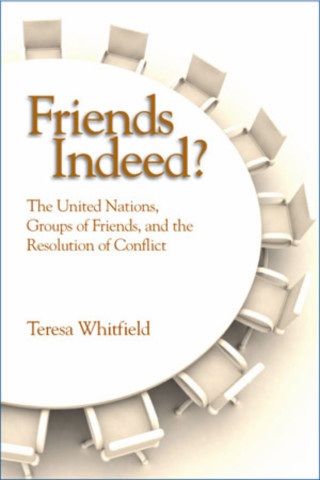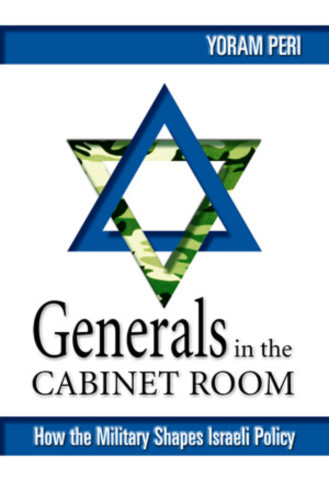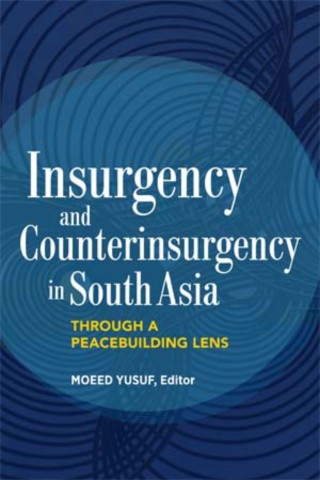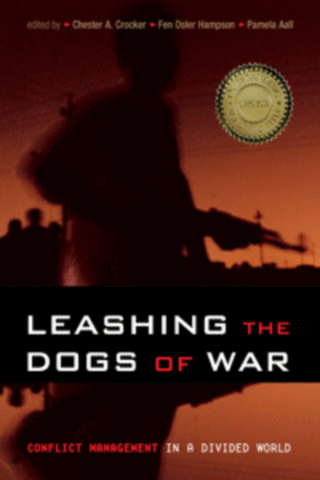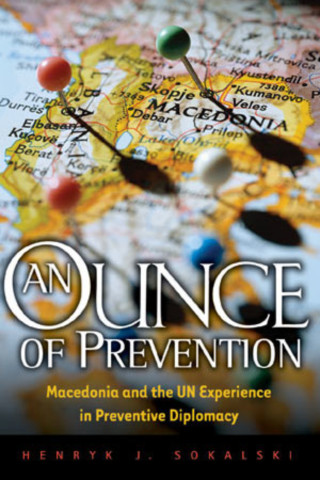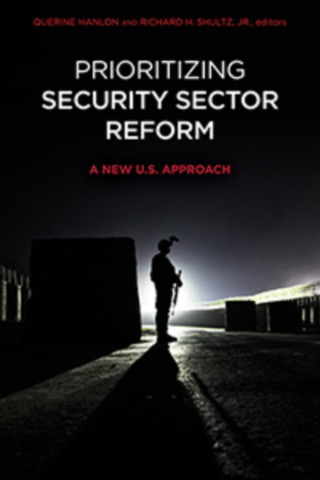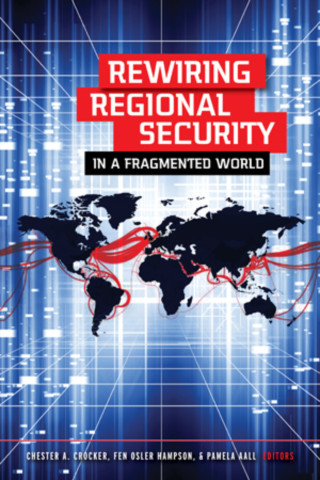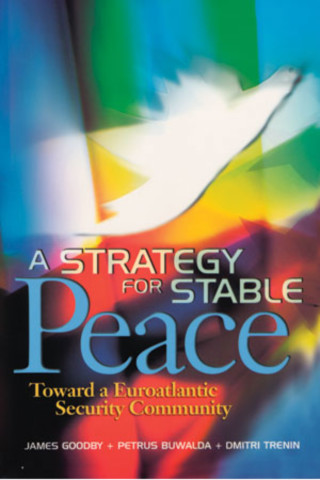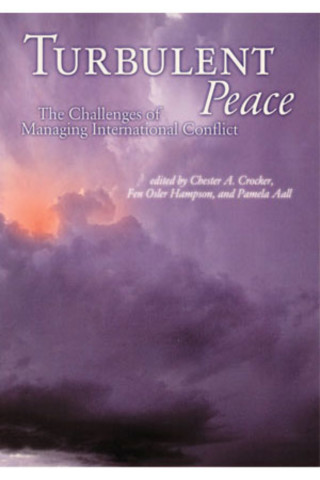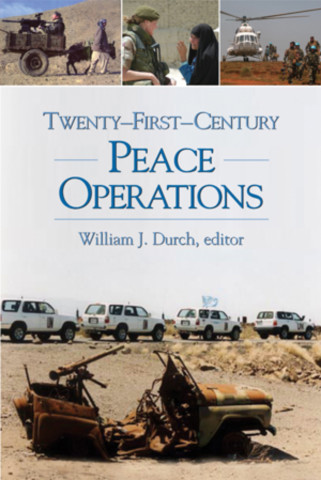Security Studies
- Sort by
Addressing an increasingly important and greatly understudied phenomenon in international affairs, this groundbreaking volume analyzes the formation, actions, and efficacy of groups of states created to support UN peacemaking and peace operations. While these groups—Friends of the Secretary-General and related mechanisms—may represent just one small component of the United Nations’ increased involvement in conflict management, they have fast become a critical element in today’s system of global-security governance.
Bringing to the study a rare combination of both a scholarly eye and an insider’s perspective of the United Nations, Teresa Whitfield provides an overview of the types of groups and coalitions that have been actively engaged in issues of peace and security within the UN sphere and identifies five core factors for their success. She also offers case studies of El Salvador, Guatemala, Haiti, Georgia, Western Sahara, and East Timor, illustrating in a comparative manner the utility and limitations of groups of Friends under widely different conditions. She ultimately arrives at conclusions and presents recommendations that will no doubt prove vital to policymakers when deciding whether to form a group of Friends or another more informal coalition. Indeed, the study provides compelling evidence for the impact—both positive and negative—that external political intervention can have on peace processes.
An original, important, and timely study, Friends Indeed? adds substantially to the literature on international conflict resolution and the role of international organizations in resolving crisis. Perhaps more significant, it greatly furthers understanding of how and in what circumstances the United Nations secretary-general and secretariat can work productively with groups of states in the resolution of conflict.
A dramatic shift of power has taken place within Israel’s political system; where once the military was usually the servant of civilian politicians, today, argues Yoram Peri, generals lead the way when it comes to foreign and defense policymaking.
In Insurgency and Counterinsurgency in South Asia, ten experts native to South Asia consider the nature of intrastate insurgent movements from a peacebuilding perspective. Case studies on India, Pakistan, Nepal, and Sri Lanka lend new insights into the dynamics of each conflict and how they might be prevented or resolved.
The definitive volume on the sources of contemporary conflict and the array of possible responses to it.
"The science of medicine was the first to discover that 'an ounce of prevention is worth a pound of cure,'" Henryk Sokalski reminds us as he begins this study of a unique United Nations mission. "In the political realm, however, its full potential has yet to be realized." Sokalski, former head of the United Nations Preventive Deployment Force (UNPREDEP) in the former Yugoslav republic of Macedonia, provides the ultimate insider's look at the UN's attempt to establish a mission in this former Yugoslav republic before the imminent eruption of mass violence spilling over from neighboring Balkan states—Serbia and its overwhelmingly ethnic Albanian province of Kosovo in particular.
An Ounce of Prevention—and the UNPREDEP mission itself—begins in early 1995 with a telephone call to Sokalski at his Warsaw home from UN Secretary General Boutros-Ghali, and it ends several years later in a disappointing Security Council veto of the mission's renewal. In between, Sokalski's study of this "novel experiment in UN peacekeeping" describes the mission's three "pillars" as well as contending theories on preventive diplomacy and early preventive action, contemporary Balkan history, and the daily bureaucratic and human challenges of reinventing civil society. All the while, Sokalski attempts to answer the question of whether the mission's renewed mandate could have prevented the country's recent destructive insurgency—and whether UNPREDEP's truncated success could serve as a model for future UN preventive deployments.
Prioritizing Security Sector Reform: A New U.S. Approach argues that security sector reform should be at the core of a new U.S. policy to strengthen the security sector capacity of countries where U.S. interests are at stake. This volume offers case studies to exemplify the context in which a new U.S. approach might be warranted, discusses other countries’ experiences with security sector reform policies, and examines how the United States should design and implement a security sector reform policy.
Rewiring Regional Security in a Fragmented World examines conflict management capacities and gaps regionally and globally, and assesses whether regions—through their regional organizations or through loose coalitions of states, regional bodies, and non-official actors—are able to address an array of new and emerging security threats.
"The United States, Russia, and all the nations of Europe could eliminate war as a means of settling disputes among themselves. It will not be easy but it is within their reach.” Thus begins this bold and yet pragmatic argument for creating a security community that runs from Vancouver to Vladivostock.
In A Strategy for Stable Peace, three eminent diplomats and scholars from Europe and the United States urge us to make the new decade a turning point in history. In place of the wars and near-wars that have plagued Euroatlantic relations over centuries, close and enduring cooperation can gradually be built on the basis of shared interests and common values.
After first outlining the concept of stable peace, the volume describes the current political, economic, and security climates within Russia, the European Union, and the United States, and then assesses various models before recommending a strategy for achieving a stable peace. Drawing on their extensive experience, the authors recommend a series of concrete, practicable policies, both long- and near-term, that the leaders of their nations can adopt.
Please see the new, replacement volume Leashing the Dogs of War.
Like its predecessor, Managing Global Chaos, this comprehensive volume explores the sources of contemporary conflict and the vast array of possible responses to it. The authors—50 of the most influential and innovative analysts of international affairs—present multiple perspectives on how best to prevent, manage, or resolve conflicts around the world.
In the five years since Managing Global Chaos was published, the geopolitical landscape has changed in significant ways and we have learned important lessons. Turbulent Peace underlines the volatility and vulnerability of states and peoples in a world that is both increasingly interconnected and ever more differentiated and decentralized in its political and social structures. Four new themes emerge from Turbulent Peace: the return of geopolitics; the recognition that different societies require different peacemaking strategies; the pull and tug between conflict management and post-conflict governance issues, such as democratization; and the understanding that creating a sustainable peace is as difficult as making peace in the first place.
Although this volume features many of the contributors to Managing Global Chaos (in most cases with updated and revised chapters), almost 70 percent of the contributors are new. The editors commissioned the new essays to address emergent themes in conflict analysis and management, to offer a wide range of viewpoints in contentious areas, and to respond to feedback from readers and the needs of educators. The result is a volume of unparalleled breadth and depth, an invaluable resource for teachers and students no less than for practitioners and policymakers.
This superbly edited volume addresses the question of what has been accomplished and what lessons have been learned from ten years of peace operations in post-conflict societies.

